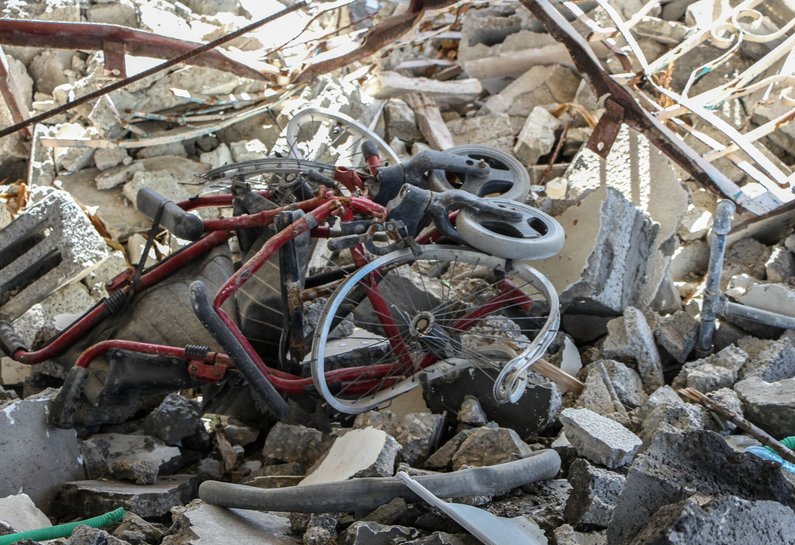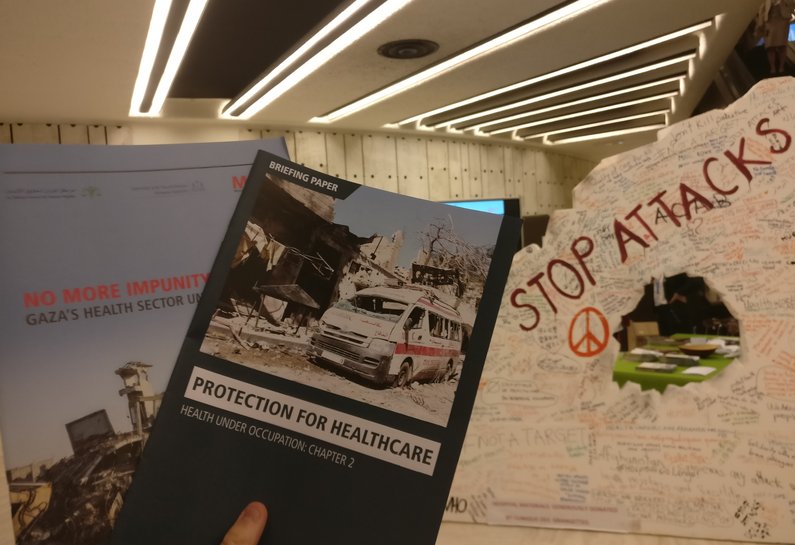UN highlights failures to protect healthcare

Behind every number is a person who defines our common humanity and deserves our compassion, especially when suffering or premature death can be prevented.
Margaret Chan, former Director General of the WHO
This week, the issue of attacks on healthcare personnel and facilities is again at the top of the agenda at the United Nations. One year after United Nations Security Council resolution 2286 received unanimous support, the UN Secretary General reported to a special session of the UN Security Council that the situation has only deteriorated.
Coinciding with the debate in New York, MAP was in Geneva to attend World Health Assembly discussions and meetings on the protection of medical facilities and personnel. We were joined by the Safeguarding Health in Conflict Coalition (SHCC), of which MAP is a member, in arguing for consistent and effective support by states for the essential protections of medical personnel and facilities outlined in international humanitarian law.
In addition to advocating for greater commitments from States internationally, the SHCC also highlighted widespread impunity in several states: “Governments that ignored, denied, or justified attacks on health facilities, potentially involving their military forces, include Afghanistan, Iraq, Israel, Libya, Russia, Saudi Arabia, Sudan, Syria, Ukraine, and the United States.”[i]
This cannot become the new reality of warfare. 15 years on from this Council’s first formal commitment to protect civilians in armed conflict, it is clear that we need a new approach.
Matthew Rycroft, UK Ambassador to the United Nations Security Council

In her intervention, Christine Beerli, Vice-President of the ICRC, quoted Dr Marco Baldan, one of ICRC’s field surgeons: “As I stand in the emergency theatre, operating on patients riddled by bullets or torn apart by explosions, I wish a handful of lead politicians in war-torn countries could join me. Would their decisions be different if faced on a day-to-day basis with the human cost of war in its most raw manifestation?” - Dr Marco Baldan, ICRC Surgeon [ii]
This Council needs to take action when violations occur. When states fail to act, it is our responsibility to decide that these abuses will not be tolerated, that we will hold those responsible accountable. In this chamber, we have a duty to shine a light on those who fail to comply with international law.
Matthew Rycroft, UK Ambassador to the United Nations Security Council
During the 2014 attacks on Gaza, MAP’s staff and partners witnessed first-hand what it means when States do not pursue accountability for violations. The increasing ferocity and scale of attacks on medical facilities and personnel between the 2008/09, 2012 and 2014 attacks on Gaza demonstrated the erosion of protections that not only keep patients and medical personnel safe during times of conflict, but also ensure that healthcare can be provided to communities after conflicts end.
Dr Ghassan Abu Sittah, a surgeon who was in Gaza with MAP during the 2014 attacks, made this remark to the United Nations in 2015: “In 2008/2009 the parking lot of the Al-Aqsa Hospital was hit by the IAF, last summer the missile was fired into the operating room killing staff and patients. And for the first time the Israeli Airforce directly targeted Al-Shifa Hospital hitting the outpatient department. These attacks on the health sector led to a 30% degradation in its capacity during the summer onslaught and are set to be a major part of future attacks on Gaza.”[iii]
On Tuesday this week, the World Health Organisation elected a new Director General,Dr Tedros Adhanom Ghebreyesus, the former Ethiopian Health Minister, to steer it through the challenges of protecting medical facilities and staff. Whilst the discussions in both Geneva and New York have brought welcome attention to the daily horrors that many patients and medical personnel face in conflicts around the world, including in the occupied Palestinian territory, the five-year term of Dr Adhanom is a crucial period for making the UN’s promises a reality.
The era of ‘winner takes all’ is over, we can only achieve our goals for the people we serve through cooperation.”Margaret Chen, former Director General of the WHO.
[i] https://www.safeguardinghealth.org/sites/shcc/files/SHCC2017final.pdf
[ii] http://webtv.un.org/watch/christine-beerli-icrc-on-protection-of-civilians-and-medical-care-in-armed-conflict-security-council-7951st-meeting/5447877647001
[iii] https://www.map.org.uk/news/archive/post/668-dr-ghassan-abu-sittah-oral-statement-on-attacks-on-healthcare-in-gaza-at-the-un-human-rights-council

